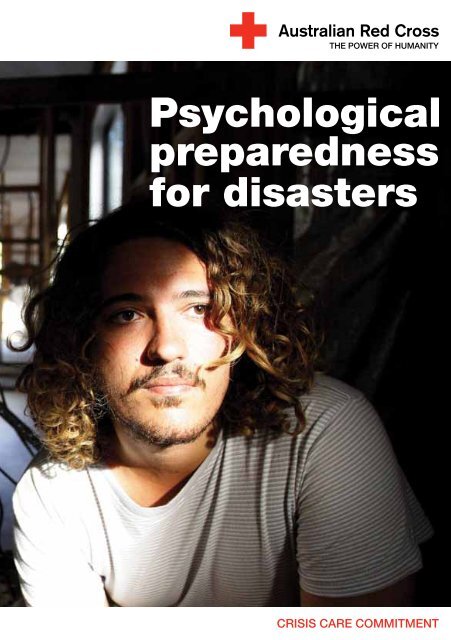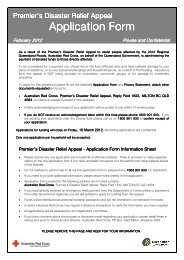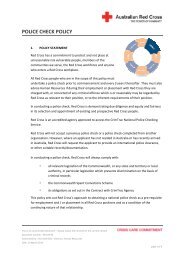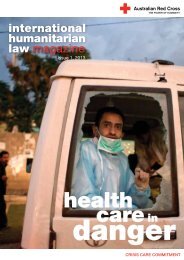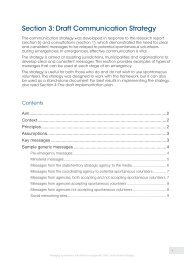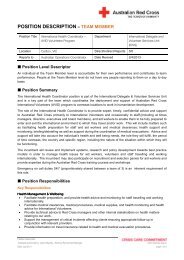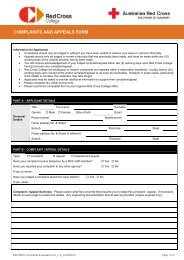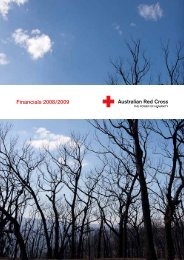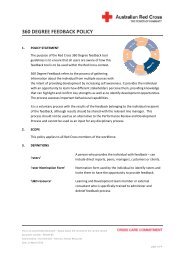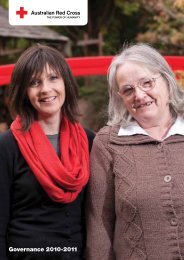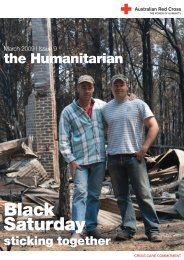Psychological preparedness for disasters - Australian Red Cross
Psychological preparedness for disasters - Australian Red Cross
Psychological preparedness for disasters - Australian Red Cross
You also want an ePaper? Increase the reach of your titles
YUMPU automatically turns print PDFs into web optimized ePapers that Google loves.
<strong>Psychological</strong><br />
<strong>preparedness</strong><br />
<strong>for</strong> <strong>disasters</strong>
Acknowledgements:<br />
Produced by <strong>Australian</strong> <strong>Red</strong> <strong>Cross</strong> in<br />
collaboration with the <strong>Australian</strong><br />
<strong>Psychological</strong> Society.<br />
<strong>Red</strong> <strong>Cross</strong> acknowledges Dr. Joseph Reser<br />
and Dr. Shirley Morrissey as authors of the<br />
original material.<br />
First edition published 2012 by <strong>Australian</strong><br />
<strong>Red</strong> <strong>Cross</strong><br />
© <strong>Australian</strong> <strong>Red</strong> <strong>Cross</strong><br />
Disclaimer:<br />
The <strong>Red</strong> <strong>Cross</strong> Emergency REDiPlan<br />
project provides people with general<br />
in<strong>for</strong>mation to help them prepare <strong>for</strong> an<br />
emergency. The in<strong>for</strong>mation is designed to<br />
assist people prepare <strong>for</strong> emergencies but<br />
necessarily contains only in<strong>for</strong>mation of a<br />
general nature that may not be appropriate in<br />
all circumstances. Be<strong>for</strong>e taking any action<br />
you should independently consider whether<br />
that action is appropriate in the light of your<br />
own circumstances.
<strong>Psychological</strong><br />
<strong>preparedness</strong><br />
<strong>for</strong> <strong>disasters</strong><br />
Introduction 03<br />
Be<strong>for</strong>e the emergency 04<br />
AIM <strong>for</strong> psychological<br />
<strong>preparedness</strong> 05<br />
Anticipate 06<br />
Identify 08<br />
Manage 11<br />
More in<strong>for</strong>mation and<br />
support services 12<br />
01
Introduction<br />
Disasters are unpredictable, destructive<br />
events that can impact in a range of<br />
ways, disrupting lives and communities.<br />
Some natural hazards tend to be<br />
seasonal, such as cyclones and bushfires.<br />
Some <strong>disasters</strong>, such as flooding and<br />
severe storms, can occur at anytime.<br />
Others occur without warning, such as<br />
earthquakes and some technological<br />
<strong>disasters</strong>.<br />
At the start of these so-called ‘seasons’,<br />
or with the issuing of an emergency watch<br />
or warning 1 , we often automatically begin<br />
practical preparations <strong>for</strong> the oncoming<br />
emergency. More and more people<br />
realise the importance of also preparing<br />
ourselves <strong>for</strong> how we might feel in an<br />
emergency.<br />
Being psychologically prepared goes<br />
hand-in-hand with being practically<br />
prepared <strong>for</strong> emergency situations.<br />
The advice in this booklet, prepared<br />
with assistance from the <strong>Australian</strong><br />
<strong>Psychological</strong> Society, is based on<br />
research and considerable practical<br />
experience in emergency situations. It<br />
provides tips on how to anticipate, identify<br />
and manage how you might feel be<strong>for</strong>e<br />
and during an emergency.<br />
Being psychologically prepared really<br />
works. You’ll feel more confident and be<br />
more prepared as you face an emergency.<br />
1 For further in<strong>for</strong>mation on emergency watches<br />
and warnings, visit www.bom.gov.au<br />
03
Be<strong>for</strong>e the emergency<br />
At the start of these periods with a higher<br />
risk of natural hazards, also known as<br />
‘seasons’, there is often a heightened<br />
awareness of the changing conditions,<br />
with many media campaigns reminding us<br />
to ‘be prepared’ <strong>for</strong> emergencies, such as<br />
cyclones or bushfires.<br />
For many people, the approach of these<br />
‘seasons’ and the appearance of warning<br />
messages, reminders, and household<br />
<strong>preparedness</strong> material, can trigger anxiety<br />
and concern. For example, as the wet<br />
season approaches in the north, or high<br />
summer in the south and the west, the<br />
weather itself can raise anxiety. Increased<br />
humidity and anticipation of changing<br />
weather can add to an underlying concern<br />
about the possibility of a cyclone, while<br />
hot, dry and windy days can build anxiety<br />
about bushfires.<br />
Most people will experience some<br />
anxiety, stress and alarm in an emergency<br />
situation – this is natural. Strong emotional<br />
responses to risk and danger are normal<br />
and even helpful <strong>for</strong> what could be a<br />
potentially life-threatening situation.<br />
At the beginning of the season or in the<br />
event of an emergency alert, it is also<br />
important to think about ‘psychological’<br />
<strong>preparedness</strong>.<br />
04
AIM <strong>for</strong> psychological <strong>preparedness</strong><br />
An important part of emergency <strong>preparedness</strong> is being able to anticipate, identify<br />
and manage (AIM) be<strong>for</strong>ehand how you and your family members are likely to feel,<br />
think, and respond to this challenging and stressful situation.<br />
Anticipate Identify Manage<br />
What you might need<br />
How you might feel<br />
What you might be thinking<br />
Specific feelings<br />
Unhelpful thinking<br />
Matters needing attention<br />
Feelings<br />
Thoughts<br />
Behaviours<br />
05
Anticipate<br />
What you might need<br />
Anticipate what you will need to prepare<br />
your home and yourself <strong>for</strong> an emergency.<br />
The <strong>Red</strong> <strong>Cross</strong> Emergency REDiPlan: Four<br />
steps to prepare your household booklet<br />
provides practical advice on how to prepare<br />
<strong>for</strong> emergencies. The State Emergency<br />
Service (SES) in your state or territory<br />
will also have specific in<strong>for</strong>mation about<br />
cyclones, severe storms, and tsunamis,<br />
while local fire services will have in<strong>for</strong>mation<br />
about how to prepare <strong>for</strong> bushfires.<br />
Engaging in simple practical <strong>preparedness</strong><br />
tasks will help to give you a sense<br />
of confidence and control. For each<br />
household, and <strong>for</strong> each emergency,<br />
circumstances will be somewhat different.<br />
Anticipating how you might feel or what<br />
thoughts you might have in a situation,<br />
such as a severe cyclone or flood warning,<br />
is reasonably easy and very helpful. Try<br />
putting yourself in the situation where<br />
specific things are happening and then<br />
imagine sounds and smells, light flashes and<br />
darkness, possible feelings and thoughts.<br />
For storms and cyclones, how might you<br />
feel or what thoughts might you have if:<br />
• the power and phone lines go out<br />
• falling tree branches or flash flooding<br />
cuts off access to your home<br />
• the house shakes from the wind or<br />
thunder<br />
• windows rattle or break<br />
• flying debris bangs up against your house<br />
• your home is damaged<br />
• you don’t know where family members<br />
might be?<br />
06
For bushfires, how might you feel or what<br />
thoughts might you have if:<br />
• the heat becomes extreme<br />
• the sky turns black<br />
• flames become visible<br />
• thick smoke reduces visibility, making<br />
your eyes water and affecting your<br />
breathing<br />
• the smell of burning bush penetrates<br />
the house<br />
• the power and phone lines go out<br />
• the house shakes from the wind<br />
• windows break<br />
• the roaring sound of the wind or fire<br />
won’t stop<br />
• your home is under ember attack, or<br />
spot fires occur in your garden or yard<br />
• you don’t know where family<br />
members are?<br />
These are some of the things that may<br />
happen during an emergency. Try to<br />
imagine yourself in this situation and how<br />
you might experience and respond to what<br />
is happening around you. Talk to your<br />
family about how they might react to such<br />
a situation as well. Remember that children<br />
may have little or no experience with an<br />
emergency situation and their reactions<br />
may be unfamiliar and new to them.<br />
How you might feel<br />
Important feelings that you need to<br />
anticipate are anxiety and fear, as well<br />
as general stress and uncertainty, and<br />
possibly helplessness. An emergency<br />
warning is a very real, serious and<br />
threatening emergency situation. If there<br />
is no warning, as often is the case with<br />
many emergencies, the uncertainty<br />
can provoke anxiety. You may feel<br />
quite anxious without recognising<br />
this emotion and its symptoms, or<br />
realising how this anxiety may influence<br />
your thoughts and behaviours.<br />
Anxiety is also pretty uncom<strong>for</strong>table<br />
and may stop you from carrying out<br />
emergency preparations.<br />
What you might be thinking<br />
How will you make sense of the situation?<br />
What questions will you ask yourself?<br />
• How long is this going to last <strong>for</strong>?<br />
• Will we be alright? Is everyone safe?<br />
What’s coming next?<br />
• Have I taken care of all of the things<br />
I should have attended to?<br />
• Is our house going to be affected?<br />
• Are the emergency services ‘on<br />
the job’?<br />
What is very stressful in a chaotic and<br />
potentially life-threatening situation is not<br />
knowing what is going to happen next.<br />
This is another instance where being<br />
psychologically prepared really helps – to<br />
monitor and manage your own, and your<br />
family’s, understanding your own and your<br />
family’s reactions in this very challenging<br />
situation. You can be the constant and<br />
familiar, predictable and dependable<br />
element in this situation. You can be and<br />
appear prepared.<br />
07
Identify<br />
Feelings<br />
It’s important to anticipate that you are<br />
likely to experience some anxiety and<br />
other emotions and symptoms associated<br />
with stressful situations. You need to be<br />
able to identify these feelings and you<br />
need to know what to do to manage<br />
them. Anxiety can be experienced in a<br />
variety of ways, but might include an upset<br />
stomach, irritability, headaches, shortness<br />
of breath and tightness in the chest.<br />
For children this might include anxious<br />
behaviours, such as excessive clinging.<br />
Anxiety won’t just ‘go away’. It’s there to<br />
help you realise that this is an emergency<br />
situation and that you must be alert and<br />
mindful about what is happening around<br />
you. But it can sometimes get in the way<br />
and even overwhelm, and you need to be<br />
able to effectively manage your response<br />
to this emergency situation.<br />
It is also very helpful <strong>for</strong> those around<br />
you to see that you are managing both<br />
the situation and your own response<br />
in a confident and focused way. This is<br />
particularly important <strong>for</strong> children, who are<br />
far more likely to become distressed when<br />
the adults they are with are stressed and<br />
overwhelmed.<br />
Unhelpful thinking<br />
Threatening situations influence our<br />
thinking as well as our feelings, and of<br />
course these are inter-related. Quite often<br />
we are lulled into a false sense of security<br />
and think things like:<br />
• We had a close call last year, so we’re<br />
not due <strong>for</strong> another flood <strong>for</strong> a while.<br />
• Every year we have cyclone warnings,<br />
but they never turn into anything bad.<br />
08
• A natural disaster is an awesome act of<br />
God or nature – there’s really nothing<br />
we can do about it.<br />
• I’m not going to think about it and<br />
get overly concerned – the threat of<br />
natural <strong>disasters</strong> is just a part of living<br />
in Australia.<br />
Another common ‘trap’ is thinking that<br />
because scientists can precisely locate<br />
and monitor natural hazards, such as a<br />
cyclone or storm, that we have adequate<br />
technological control over its impacts and<br />
consequences.<br />
Each of these examples reflects a<br />
particular kind of ‘protective’ thinking<br />
which offers some false reassurance,<br />
but can hinder effective <strong>preparedness</strong>.<br />
Cyclones, storms, bushfires, floods,<br />
earthquakes, tsunamis and humancaused<br />
<strong>disasters</strong> are unpredictable events<br />
that can occur at any time, no matter what<br />
may (or may not) have happened recently<br />
or in previous years.<br />
Matters needing attention<br />
Not thinking about a threatening<br />
possibility, or denying the need to<br />
undertake emergency <strong>preparedness</strong><br />
activities, ultimately makes us more<br />
anxious and far less practically and<br />
psychologically prepared, in the event<br />
of a watch or warning situation.<br />
Anticipating the thoughts that we might<br />
have (as well as how we might feel), when<br />
we come across seasonal reminders at<br />
the beginning of the season or during an<br />
emergency watch or warning, ‘inoculates’<br />
us against unhelpful thinking and inaction,<br />
and helps us to be more realistic, focused,<br />
and adequately prepared during a very<br />
real emergency situation.<br />
09
Manage<br />
Feelings, thoughts and behaviours<br />
People generally know their own body best<br />
and what they can do to reduce anxiety,<br />
stress or fear. Use familiar techniques to<br />
help manage your feelings. Other things<br />
you or your family can do include:<br />
• Be practically prepared and have a<br />
plan to reduce anxiety and stress,<br />
e.g. what will you do if you lose power?<br />
• Practise calming techniques,<br />
e.g. deep, relaxed breathing.<br />
• During the emergency, if you are<br />
physically active and it is safe to do<br />
so, check the house <strong>for</strong> damage and<br />
make sure you take breaks, and eat<br />
and drink regularly.<br />
• Concentrate on practical tasks<br />
and remember to just focus on the<br />
immediate situation – try not to think<br />
about the worst outcome.<br />
• Monitor your radio or appropriate<br />
websites (if power is available) <strong>for</strong> the<br />
latest in<strong>for</strong>mation, or keep in touch with<br />
people you know who have access to<br />
the latest in<strong>for</strong>mation.<br />
• Keep up-to-date with alerts using<br />
the DisasterWatch Phone application,<br />
www.em.gov.au.<br />
• Be mindful that social media websites<br />
such as Twitter and Facebook can be<br />
good sources of current in<strong>for</strong>mation,<br />
but they can also be sources of<br />
inaccurate in<strong>for</strong>mation, which may<br />
cause stress. Monitor sites from<br />
reputable sources, such as police or<br />
emergency services agencies.<br />
• Don’t take any risks – you cannot<br />
af<strong>for</strong>d to get hurt.<br />
• Com<strong>for</strong>t and keep children near and<br />
try not to show your fear or distress.<br />
Listen to their concerns and correct<br />
any thoughts or ideas that might be<br />
exaggerated or inaccurate.<br />
11
More in<strong>for</strong>mation and support services<br />
If you do experience an emergency and<br />
you find yourself emotionally affected<br />
by the experience, seek assistance. It<br />
might be as simple as talking it over with<br />
a family member, friend, or someone you<br />
feel you can trust. Despite a frightening<br />
experience, most people will recover<br />
well. Both <strong>Red</strong> <strong>Cross</strong> and the <strong>Australian</strong><br />
Psychology Society have practical<br />
advisory in<strong>for</strong>mation on coping with the<br />
aftermath of emergencies. If the feelings<br />
don’t subside, then it is best to seek<br />
professional assistance.<br />
Being ‘psychologically<br />
prepared’ goes handin-hand<br />
with being<br />
‘practically prepared’ <strong>for</strong><br />
emergency situations.<br />
Being cooler, calmer and more collected<br />
is a substantial aid to family members and<br />
others who may not be as well prepared<br />
psychologically <strong>for</strong> what is happening.<br />
AIMing <strong>for</strong> psychological <strong>preparedness</strong><br />
helps to ensure general <strong>preparedness</strong>. It<br />
also enhances your ability to cope with<br />
your own responses, and those of others,<br />
as well as with the event itself.<br />
For further in<strong>for</strong>mation on practical<br />
<strong>preparedness</strong> in<strong>for</strong>mation, contact<br />
<strong>Red</strong> <strong>Cross</strong> in your state or visit<br />
www.redcross.org.au.<br />
For further in<strong>for</strong>mation on<br />
psychological <strong>preparedness</strong> in<strong>for</strong>mation,<br />
contact the <strong>Australian</strong> Psychology<br />
Society on 03 8662 3300, email<br />
contactus@psychology.org.au, or<br />
visit www.psychology.org.au.<br />
For further in<strong>for</strong>mation on floods,<br />
cyclones, storms, and tsunamis, visit<br />
the Bureau of Meteorology website<br />
www.bom.gov.au or your state SES.<br />
For in<strong>for</strong>mation on earthquakes, visit<br />
the Geoscience Australia website,<br />
www.ga.gov.au. For in<strong>for</strong>mation on<br />
bushfires, visit your local fire service<br />
website in your state or territory.<br />
12
National Office<br />
155 Pelham Street<br />
Carlton VIC 3053<br />
Tel +61 3 9345 1800<br />
Fax +61 3 9348 2513<br />
www.redcross.org.au<br />
ACT<br />
Cnr Hindmarsh Drive<br />
and Palmer Street<br />
Garran ACT 2605<br />
Tel 02 6206 6000<br />
Fax 02 6206 6050<br />
NSW<br />
464 Kent Street<br />
Sydney NSW 2000<br />
Tel 02 9229 4111<br />
Fax 02 9229 4244<br />
NT<br />
Cnr Lambell Terrace<br />
and Schultze Street<br />
Larrakeyah NT 0820<br />
Tel 08 8924 3900<br />
Fax 08 8924 3909<br />
QLD<br />
49 Park Road<br />
Milton QLD 4064<br />
Tel 1300 55 44 19<br />
Fax 07 3367 7444<br />
SA<br />
207-217<br />
Wakefield Street<br />
Adelaide SA 5000<br />
Tel 08 8100 4500<br />
Fax 08 8100 4501<br />
TAS<br />
40 Melville Street<br />
Hobart TAS 7000<br />
Tel 03 6235 6077<br />
Fax 03 6231 1250<br />
VIC<br />
23-47 Villiers Street<br />
North Melbourne<br />
VIC 3051<br />
Tel 03 8327 7700<br />
Fax 03 8327 7711<br />
WA<br />
110 Goderich Street<br />
East Perth WA 6004<br />
Tel 08 9225 8888<br />
Fax 08 9325 5112


